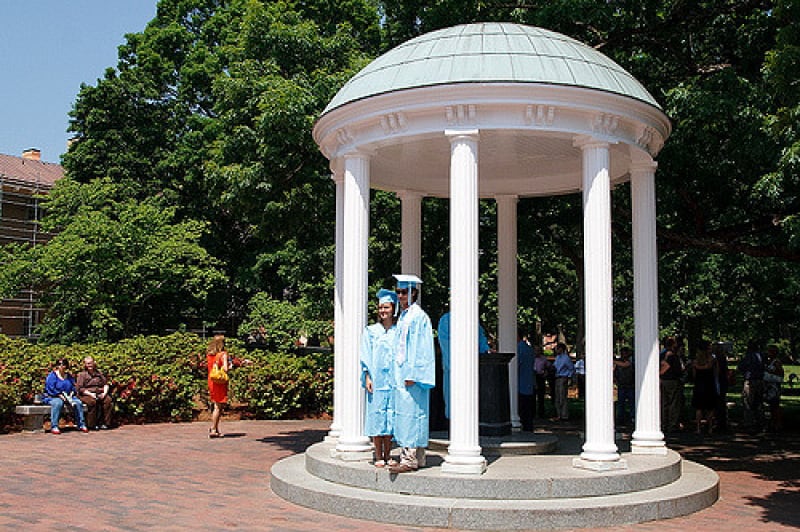
In October 2003 James Moeser, then the chancellor of the University of North Carolina at Chapel Hill, announced a plan to eliminate loans from the financial aid packages of undergraduates from low-income families.
The new policy, known as the Carolina Covenant, turned Carolina into a national leader in efforts to address a limited but significant aspect of the diversity issue in U.S. higher education: helping academically gifted low-income students to enroll in elite public universities and, once there, to persist and graduate.
Data show that the Carolina Covenant has succeeded in raising retention and graduation rates among low-income undergraduates and narrowed chronic gaps between low-income and middle-class students, especially with respect to African-American males.
Since the first cohort of 224 “Covenant Scholars” set foot on the campus in the fall of 2004, their ranks have expanded dramatically. Last fall the Covenant admitted 768 new Scholars, the largest group ever.
One in seven (14 percent) members of the Class of 2019 qualify for the program, which is open to both in-state and out-of-state students. The total number of Covenant Scholars, both current students and alumni, has reached 6,083 and counting.
Thus far the financial model underlying the Carolina Covenant has continued to be viable, but the program now faces challenges. UNC leaders now talk openly about the need to raise private philanthropic funds to sustain the Covenant.
Under the terms of the Carolina Covenant, the education costs of students from low-income families are covered entirely by a combination of grants, scholarships, and a federal work-study job – with no loans involved. UNC officials are quick to emphasize that the Covenant is not an affirmative action program.
Students must first earn admission to this highly selective public flagship. Once a first-year class has been selected, UNC officials identify students who come from families whose income is at or below 200 percent of the poverty level and qualify for federal student aid, and they are automatically designated as “Carolina Covenant Scholars.”
There are no quotas governing how many will be selected any given year. Officials also emphasize that, since it includes a work component, the program is not a handout.
At its core, Carolina Covenant was a financial aid policy with an implicit message. University officials understood that low-income families, many of whom have experienced the negative effects of household debt, are loathe to borrow. As Chancellor Moeser put it in a recent interview, “Everyone knows what ‘no loans’ means.”
But eliminating loans was only the first step. Shirley Ort, the associate provost and director of scholarships and student aid who conceived of the program and has served as its first and only director, understood that students from low-income families face special challenges ranging from medical emergencies and pressure to share some of their financial aid with family members to lack of familiarity with the culture of higher education.
Robert Shelton, who as provost was instrumental in establishing the Covenant, recalled an encounter with a student who was going hungry because he did not know how to cash his financial aid check. “He came from a very rural family and never had a bank account,” Shelton explained.
As soon as the Covenant was operative, Ort and her colleagues began building up counseling components. They recruited faculty members to serve as mentors and then introduced peer mentoring. She also built up a counseling staff dedicated to understanding the special needs of first-generation students.
A key figure was the late Fred Clark, a member of the languages faculty who signed on in 2004 as a faculty academic coordinator of the Covenant and epitomizes the informal supports that are so important in such programs. In addition to his formal duties, Clark became a mentor and friend to hundreds of Covenant Scholars and made a point of helping them acquire the cultural capital that middle-class students take for granted.
He gave out his cellphone number with abandon and made a habit of taking Scholars to lunch at the nearby Top of the Hill restaurant – which for some was their first experience in a sit-down restaurant.
Over the years Ort and her colleagues found ways to expand the opportunities available to Scholars. They found funds for study abroad and summer school activities and made sure that Scholars were included in the “etiquette dinners” run by the university career services office.
Robert Emerson, a member of the first cohort of Scholars, cited these among his most memorable experiences. “I had a lot to learn if I wanted to join the ranks of people whom I highly respected and wanted to socialize with,” he recalled. Although not intended as a recruiting tool, the Covenant has given the admissions office a tool for broadening the applicant pool. “With the Carolina Covenant, we are telling students that college is affordable – no matter how little their family makes,” said Moeser, who commented, “Of all the things that I did as chancellor, I think I am more proud of the Covenant than anything else.”
Over the years the Carolina Covenant has gradually worked its way into the DNA of a school that has prided itself on being the “University of the People.” “I think the community is really proud of the Covenant and the Covenant Scholars,” said Stephen M. Farmer, vice-president for enrollment and undergraduate admissions and another pivotal figure in its evolution. “You can see it in the faces of colleagues when they talk about the Covenant and their interest in first-generation students on this campus.”
Since the start of the program, the four-year graduation rates of Covenant Scholars has increased by 23.5 percentage points – from 56.7 percent in a Covenant-eligible control group in 2003, the year before the Covenant came into being, to 80.2 percent for the class entering in 2011. Over this period the graduation rates between non-needy and Covenant-eligible students has narrowed from 17.4 to 4.2 percentage points. It has contributed to growing persistence and graduation rates of disadvantaged students, especially African-American males.
Financing the Covenant is a continuing challenge. The program was initially possible because of Carolina’s relatively low tuition levels and funds from a state grant program that could be used for need-based aid. Since then the Board of Governors of the public university system has capped the share of gross tuition revenue that can be used for need-based financial aid for undergraduates.
The University acknowledges that the long-term vitality of the Covenant will require raising private funds, something that the university has traditionally been reluctant to do. UNC basketball coach Roy Williams, who himself would have qualified as a Covenant Scholar as an undergraduate had the program existed, has helped raise funds with his message that “everybody deserves a shot.” Carol Folt, the current chancellor, described the Covenant as “a very deep commitment” personally and said that funds for need-based aid will be an important priority in the university’s upcoming capital drive.
Covenant Scholars speak with feeling about the doors that the Covenant has opened for them. “I see kids who are in high school whose biggest dreams are to work at the local store,” said Robert Emerson, who credits the Covenant with enabling him to come to Chapel Hill. “They love video games, but they don’t know that they can design video games. They don’t know that they can change the world.”
In its early years the Carolina Covenant attracted national attention, and as many as 40 other major public universities adopted their own versions.
Since then, however, many of them, most notably the University of Virginia, have now pulled back from their commitments to need-based financial aid.
Some UNC observers think that such thinking is short-sighted.
James H. Johnson Jr., a demographer at UNC’s Kenan-Flagler Business School who has been an advisor to the Covenant, noted that students with backgrounds similar to the Covenant Scholars are becoming an increasingly significant proportion of the higher education population.
“[The Covenant] is going to be at the mainstream core of the university system because it has to be,” he said. “We have to figure out strategically how to make a Carolina Covenant kind of program work for a much large cadre of students. It might not have the same kind of architecture that it has today, probably not. But the essence of the Covenant has to be something that is at the core of the operating system of the university if we take seriously the Constitutional mandate to serve the people of the state of North Carolina.”
Editor’s Note: This article was published in The Hechinger Report on April 12, 2016. It is reprinted here with the author’s permission.
